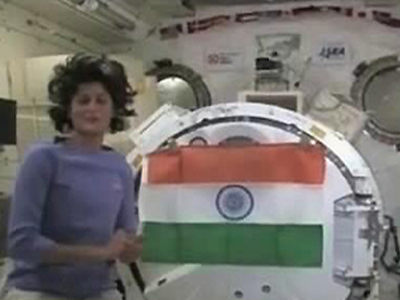
New Delhi, August 15: Indian-American astronaut Sunita Williams displayed the tricolour on board the International Space Station and wished Indians a very happy Independence Day.
"I wish India a very happy Independence Day for August 15... India is a wonderful country and I am very proud to be a part of India," Williams said in her message.
"Of course, you know that I am half Indian. My father is from Gujarat. India is a very colourful and wonderful place and I am very proud to be from there. Happy Independence Day to everybody in India," she added.
This history-making event occurred on the annual program hosted by Riti Sunshine Bhalla, when the Indian American Astronaut called out from the International Space Station. It was for the first time in 65 years since India gained freedom, an astronaut, Sunita Williams, greeted the people of India and the Indian people around the world from outer space.
"Thank you Riti Sunshine for inviting me to join in your Indian Independence celebration," said Williams, while displaying the tricolor on board the International Space Station. She also gave a guided tour of the Space Station.
The unique celebration of the 65th anniversary of India's independence in the International Space Station is the brainchild of Varinder Bhalla, producer and director of the program.
Extensive planning and coordination was done with the help of the U.S. National Aeronautics and Space Administration.
"Riti worked very hard for this program all summer," said Varinder Bhalla.
"Riti and I traveled to Boston to interview Dr. Deepak Pandya, the father of the Astronaut as well as the Governor of Massachusetts, where Williams grew up. We then traveled to Mumbai to videotape greetings from Bollywood celebrities for Sunita, all in a span of ten days," added the proud father of the teen host.
Over 100 million viewers across India are likely to watch the Astronaut's greetings, on 80 national and regional TV channels in India.
"Five years ago, we started the program with the intent to pay homage to the freedom fighters who gave up their lives so India could be free. This year, we are dedicating our Independence Day Special to Sunita Williams, who has made a billion people of India so proud," said Riti Sunshine.
Bollywood celebrities Yash Chopra, Shah Rukh Khan, Sanjay Dutt and Anushka Sharma also offered their greetings to Williams on the Riti Bhalla Special, the TV program named after the teen host, a student of New York University.
Bhalla, 18, started her annual Independence Day in 2008, when she was only 13 years old.
U.S. Senator Bob Menendez joined Riti Sunshine in the celebration for the fifth time in he last five years.
Congressman Steve Israel, a strong supporter of India on Capitol Hill, also participated in the televised celebration. Both offered their best wishes to the Indian American Astronaut and shared their pride with the people of India.
Since 2008, 10 governors of America, 22 senators and congressional leaders as well as the former President of India, Dr. Abdul Kalam, have appeared as guests on her Independence Day show, which is telecast in 23 countries.
Williams, 46, along with Yuri Malenchenko of Russia and Japan's Akihiko Hoshide left for the ISS aboard a Russian spacecraft Soyuz TMA-05M on July 15 from the Baikonur cosmodrome in Kazakhstan.





Comments
Add new comment